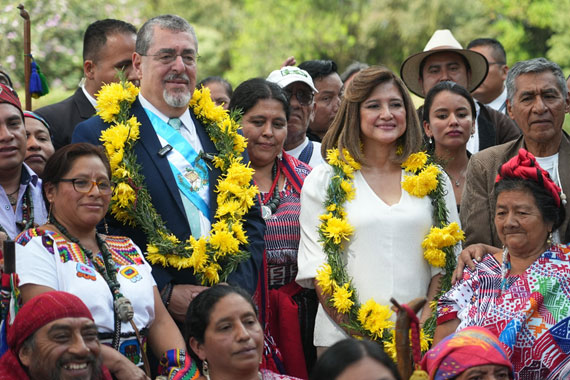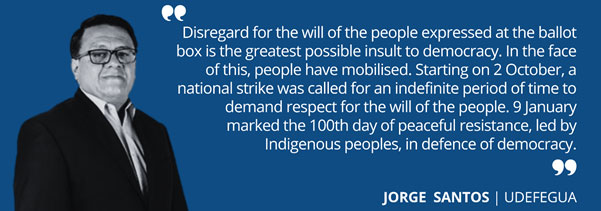Guatemala’s Chance for a New Beginning

MONTEVIDEO, Uruguay, Jan 18 (IPS) - Guatemala’s new president, Bernardo Arévalo, was expected to be sworn in on 14 January at 2pm –the 14th at 14:00, as people repeated in anticipation for months. It was a momentous event – but it wasn’t guaranteed to happen.
One year earlier, Arévalo – co-founder of the progressive Movimiento Semilla (Seed Movement), a political party born out of widespread 2015 anti-corruption protests – was largely unknown, freshly selected as his party’s presidential candidate. He wasn’t on the radar of opinion polls. A long chain of unlikely events later, he’s become the first Guatemalan president in living memory who doesn’t belong to the self-serving elites who Guatemalans call ‘the corrupt pact’, which he has credibly promised to dismantle.
The fear this caused among corrupt elite that has long ruled Guatemala was reflected in a series of attempts to try to stop Arévalo’s inauguration. The huge and sustained citizen mobilisation that came in response can largely be credited with keeping alive the spark of democracy in Guatemala.

Last-minute delays
All the Guatemalan Congress needed to do on the morning of 14 February was certify its newly elected members so the body could swear in the new president. But this routine administrative procedure was dragged on for many hours. The Indigenous movement, at the forefront of the months-long protests that had successfully kept at bay successive attempts to reverse the election results, called on Indigenous communities throughout Guatemala to remain on the alert.
In the late afternoon the Secretary General of the Organization of American States, Luis Almagro, surrounded by members of numerous foreign delegations, read a declaration calling on Congress to hand over power, ‘as required by the Constitution’, to the president-elect. This signalled that the world was watching.
As tensions mounted, Semilla reached an agreement for one of its representatives to be elected as president of Congress. This allowed the certification process to resume, and Arévalo was finally sworn in shortly after midnight. Night-long celebrations followed.
A coup attempt in stages
Arévalo’s election was unexpected. He only made it into the 20 August runoff because several other contenders not to the elite’s liking had been disqualified ahead of the first round. His candidacy wasn’t blocked because he scored so poorly in the polls. People’s expectations were extremely low, and first place went to invalid votes.
But once Arévalo entered the runoff, his rise was unstoppable. Death threats soon poured in, and an assassination plot involving state and non-state forces came to light days before the runoff.
As soon as the first-round results were announced, nine parties submitted complaints about supposed ‘irregularities’ that had gone undetected by all international observers. Their supporters converged outside the Supreme Electoral Tribunal (TSE) calling for a rerun.
The Constitutional Court instead ordered a recount and instructed the TSE to suspend official certification until complaints were resolved. Following the recount, the TSE eventually endorsed the results two weeks later.
But meanwhile, Attorney General Consuelo Porras Argueta, an official under US sanctions for corruption, launched an investigation into Semilla for alleged irregularities in its registration process and had its offices raided. She also ordered two raids on TSE offices, and when the TSE officially announced Arévalo as one of the runoff contenders, she ordered Semilla’s suspension. The Constitutional Court however blocked this order and the runoff ran its course. Arévalo took 58 per cent of the vote, compared to 37.2 per cent for the pro-establishment candidate.
Efforts to stop Arévalo’s inauguration began immediately, with yet another attempt by the Public Prosecutor to have Semilla suspended. The Constitutional Court continued to receive and reject legal challenges until the day of the inauguration.
For 100 days, two different visions of Guatemala wrestled with each other: people eager for change protested nonstop while corrupt forces linked to organised crime strove to preserve their privileges at any cost.
Democracy on life support
Guatemala has long been classified as a ‘hybrid regime‘ with a mix of democratic and authoritarian traits. Under outgoing president Alejandro Giammattei, civic freedoms steadily deteriorated. State institutions grew even weaker, ransacked by predatory elites and coopted by organised crime.
One of the last acts of Giammattei’s predecessor and ally, Jimmy Morales, was to end the work of the International Commission against Impunity in Guatemala (CICIG). Charged with supporting and strengthening state institutions to investigate and prosecute serious crimes, CICIG helped file over 120 cases in the Guatemalan justice system and its joint investigations with the Attorney General’s Office led to over 400 convictions.
Under Giammattei, the Attorney General’s Office dismantled all anti-corruption efforts and criminalised those in the legal profession who’d worked alongside CICIG. Impunity flourished. Transparency International’s 2022 Corruption Perceptions Index found evidence of strong influence by organised crime over politics and politicians, with some crime bosses seeking and securing office.
It’s no wonder that Guatemalans’ trust in state institutions hit rock bottom. According to the latest Latinobarómetro report, in 2021 satisfaction with the performance of democracy stood at a meagre 25 per cent.
Challenges ahead
Arévalo came to the presidency on a credible anti-corruption platform. But dismantling dense webs of complicity, rooting out entrenched corruption and rebuilding state institutions are no easy tasks.
Among the many challenges is a highly fragmented Congress in which 16 parties are represented, with Semilla on only 23 out of 160 seats. A large majority of Congress remains on the payroll of the interests Arévalo has promised to take on, along with most of the justice system. The 14 January events made clear that the ‘corrupt pact’ will do anything it can to stop Arévalo.
Arévalo’s to-do list is long, ranging from reducing political spending and improving social services to reversing laws that criminalise protest and establishing an effective protection mechanism for human rights defenders. At the top is forcing the resignation of Attorney General Consuelo Porras, the highest official presiding over a judicial network set up to ensure the impunity of the ‘corrupt pact’.
Arévalo can’t remove the Attorney General unilaterally, and so will have to negotiate her departure. This will be a key early test of the hope invested in him to keep democracy alive. Many more are sure to come.
Inés M. Pousadela is CIVICUS Senior Research Specialist, co-director and writer for CIVICUS Lens and co-author of the State of Civil Society Report.
© Inter Press Service (2024) — All Rights Reserved. Original source: Inter Press Service
Where next?
Browse related news topics:
Read the latest news stories:
- Trump, Democracy and the U.S. Constitution Friday, March 14, 2025
- Is UN in Danger of Losing its Battle for Gender Equality? Friday, March 14, 2025
- Women and Girls in Afghanistan Bear the Brunt of the Country’s Crisis Thursday, March 13, 2025
- Activists Fear Kenya Forests Threatened Due to Government Development Thursday, March 13, 2025
- Trashing Jewish Values Risks Israel’s Survival as We Know It Thursday, March 13, 2025
- Conflict, hunger, poverty impede children's early development: Türk Thursday, March 13, 2025
- ‘Brighter future hangs in the balance’ in Syria after 14 years of war Thursday, March 13, 2025
- UN chief hails Kyrgyz-Tajik border treaty breakthrough Thursday, March 13, 2025
- Sudan war: Children facing ‘unimaginable suffering’, warns UNICEF chief Thursday, March 13, 2025
- Europe grapples with highest number of measles cases in more than 25 years Thursday, March 13, 2025
Learn more about the related issues: